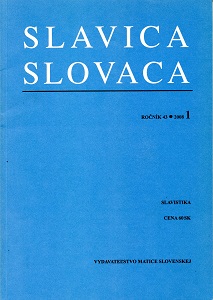Filozofia v 9. storočí (textovo-sémantická analýza Života Konštantína)
The Philosophy in 9th Century (A Textual and Semantic Analysis of Vita Constantini)
Author(s): Ľuboš LukovinySubject(s): Language and Literature Studies
Published by: SAV - Slovenská akadémia vied - Slovenský komitét slavistov a Slavistický ústav Jána Stanislava SAV, v.v.i.
Keywords: Definition of philosophy; Glagolitic alphabet; Greek-Church Slavonic textual equivalences; Constantine the Philosopher; Pseudo-Dionysios Areopagites; Maxim the Confessor
Summary/Abstract: The paper is focused on historical semantics of the term Philosophy, which we can find in Church Slavonic Vita Constantini. Semantics of the term is explained on the basis of Byzantine sources especially the works of Maxim the Confessor and John Damascene. The definition of philosophy (Vita Constantini IV.) is reconstructed in Glagolitic original and the Greek textual equivalents of this definition are adduced, the text of John Damascene being its most probable source. The formal and systematic view of philosophy and its content, as displayed in the Byzantine literature of the 7th and 8th centuries, is investigated. Further topics: John Damascene; Byzantine education; Byzantine philosophy; Byzantine theology; dialectic; syllogism.
Journal: Slavica Slovaca
- Issue Year: 43/2008
- Issue No: 01
- Page Range: 11-28
- Page Count: 18
- Language: Slovak

